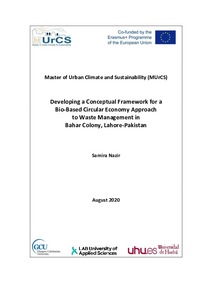Developing a Conceptual Framework for a Bio-Based Circular Economy Approach to Waste Management in Bahar Colony, Lahore-Pakistan
Nazir, Samira (2020)
Nazir, Samira
2020
All rights reserved. This publication is copyrighted. You may download, display and print it for Your own personal use. Commercial use is prohibited.
Julkaisun pysyvä osoite on
https://urn.fi/URN:NBN:fi:amk-2020111522911
https://urn.fi/URN:NBN:fi:amk-2020111522911
Tiivistelmä
The traditional approach to economic growth is based on the concept of “take, make, use, and dispose”. This has produced a ‘throw-away’ society that is not sustainable and is affecting the environment and human health, especially in developing countries where the waste management is mostly ignored. There is a need to move away from this, which has promoted many countries to identify a sustainable way of waste management. The most recent identified solution in this context is the “Circular Economy”. This study explores detail on CE by reviewing the literature on Finland as an example and more precisely the “BIOREGIO project” Lahti, where all biowaste is being managed through CE practices. The study aims to assess the need and development of a conceptual framework based on CE principles for biowaste management of Bahar Colony Lahore, Pakistan. The methodology adopted to collect the data includes field surveys and interviews of BC residents, private waste collector, and Lahore Waste Management Company officials. Both qualitative and quantitative data have been gathered to critically analyse the baseline situation and issues of waste management from generation till disposal. The results revealed that the current system is mainly focused on waste collection and transportation, and besides the availability of sanitary landfill, controlled dumping and other illegal ways of waste disposal are being practiced. There is no formal system for waste segregation and recycling. The higher rate of organic waste production in the system showed CE potential, which was assessed through the Strengths, Weaknesses, Opportunities, Threats (SWOT) analysis. The conceptual framework developed based on the outcome of SWOT analysis and lessons learned from the BIOREGIO project further allows the visualisation of a new biowaste management process based on CE principles. The implementation of which will provides benefits to LWMC and the entire country not only in terms of waste management but also environmental, social, and economic improvements. The study concluded CE as a feasible solution for sustainable waste management, however, to implement CE LWMC first has to overcome the existing issues by following the recommendations proposed in the study.
